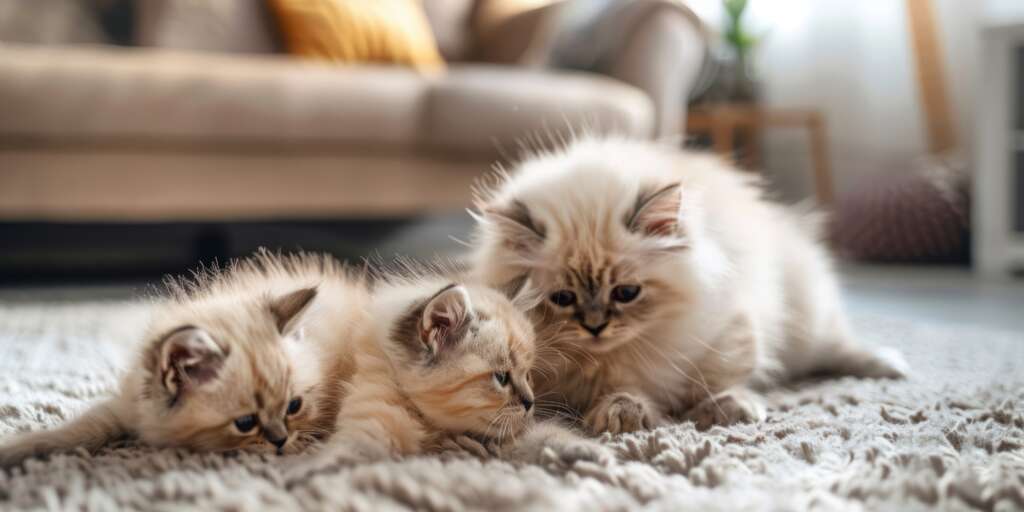Share This Article
It’s often said that cats have nine lives. But could they also help us live a mentally healthier life? The soothing purr of a cat in your lap might seem simple. Yet, studies show it’s more than just a comfort.
Recent studies reveal the benefits of owning a cat. Petting a cat can release hormones that lower stress. A slower heart rate, lower blood pressure, and balanced anxiety show this.
A cat’s purr can even help with physical healing. It can improve breathing, lower blood pressure, and aid in recovery from infections and bone injuries.
Cats also have a big impact on mental health outside the home. Therapy cats are used in schools, hospitals, and addiction centers. They help people with PTSD, dementia, and more.
Statistics show that 86% of pet owners say their pets, including cats, improve their mental health. 69% say their pets help reduce stress and anxiety. These numbers show how important cats are for our health and happiness.
As we explore the world of cat ownership, it’s clear that cats can greatly improve our lives. Nearly 35% of people welcome cats into their homes. They bring a form of therapy into our daily lives, one purr at a time.
The Calming Effect of a Cat’s Purr on Human Anxiety and Stress
The calming effect of a cat’s purr on humans is quite interesting. It’s a mix of nature and science. Studies show that a cat’s purr can help heal human bones and tissues. It’s not just a soothing sound.

Cats offer emotional support through their purrs. These vibrations are in a range that helps heal. They can reduce swelling, ease pain, and help muscles repair. This helps lower physical stress and improves mental health.
Research also shows that cats help with mental health. People with anxiety and neuroticism feel closer to their cats. This emotional bond helps those with depression feel better. Purring is more than a sound; it signifies comfort and stability.
Cats also help with overall health. Just petting a purring cat can lower stress and blood pressure. This is especially true for people at risk of heart attacks. Owning a cat can reduce this risk by almost 40%.
The reliable, gentle purr of a cat does more than warm laps—it warms hearts and heals the lingering pangs of day-to-day stress.
In summary, cats do more than just keep us company. Their purrs offer emotional support and mental health benefits. They are seen as emotional anchors and healers in many homes.
Companionship of Cats: A Remedy for Loneliness
Pet ownership, especially with cats, is known to help with mental health issues like loneliness. Studies show that cats are more than pets; they offer emotional support. For many, a cat is a comfort against loneliness.
A study in May 2023 by the U.S. Surgeon General found loneliness is a big problem, especially for older adults. Cats have become important companions. By fostering shelter cats, 29 older adults felt less isolated. Caring for a cat gave them a routine and a meaningful bond, like in human relationships.

The emotional support from cats is clear in how they improve their owners’ mental health. The study found that having a cat made people happier and less stressed. Cats bring joy and company, reducing feelings of loneliness.
Pet ownership is more than just having a friend; it gives a sense of purpose. Caring for a cat adds structure to one’s day and improves life satisfaction. This is especially true for older adults who need a routine to stay engaged.
In summary, the benefits of owning a cat are many, especially in providing emotional support and fighting loneliness in older adults. Cats bring light and joy into their owners’ lives, showing they are more than pets; they are friends and healers.
Cats and Mental Health: The Emotional Support of Feline Friendship
The bond between humans and cats is more than comforting; it’s a key to emotional stability. Studies by the National Center for Biotechnology Information show that cats can increase ‘the cuddle chemical’, oxytocin. This hormone boosts feelings of well-being and emotional connection in pet owners.
Pet therapy with cats is important, even if it’s not as well-known as dog therapy. A UK survey by Cats Protection found that cats help people deal with stress and improve their well-being. This is especially true for those with mental health issues.
According to Filipa Denis’s research at Cornwell College, individuals who formed attachments with cats experienced soothing effects that helped alleviate feelings of anxiety.
Cats offer more than just companionship; they provide vital emotional support. They meet the human need for touch and offer comfort without being too demanding. Stories from pet owners like Becky Cole and Alyssa Heller show how cats help reduce feelings of isolation and anxiety.
Feline companionship turns a house into a home, where worries feel less heavy. This connection is emotional and has physical benefits. Cat owners have lower heart rates and blood pressure than those without pets.
In summary, cats are not just pets; they are vital emotional support companions. They help ease stress, increase happiness, and build trust. Cats play a crucial role in many people’s journey to mental wellness.
Feline Therapists: How Cats Contribute to Pet Therapy
Cats are making a big impact in therapy, even though dogs are more common. They help in schools, hospitals, and homes. Pet therapy with cats is key to improving cats well-being.
In Canada, cats are becoming more recognized in therapy, with 16 teams compared to 570 dog teams. In the U.S., 94% of therapy animals are dogs, but cats are also making a difference. They show that cats can be more than just pets; they can be therapeutic.
Studies worldwide show cats’ role in therapy. In Australia, cat owners are happier and healthier. This shows that cats and well-being are closely linked, offering a new way to help people.
Therapy cats have a big impact, especially on children with autism. About 30% of these children show more social skills and affection with cats. So, therapy cats do more than just keep company; they help with social and emotional growth.
Therapy cats also help with stress, anxiety, and even Alzheimer’s. They are well-suited for therapy due to their calming presence. Training and health checks are key to their success in therapy.

Using cats in therapy is a big part of modern care. It shows that cats can be more than pets; they can be healers and supporters for mental and cognitive health.
The Role of Cats in Stress Reduction and Mindfulness Practices
Research shows that cats reduce stress and improve well-being. They are more than pets; they are natural therapists. Being around a cat, especially when they purr, can lower stress hormones and boost mood.
Many people find that having a cat helps them deal with stress and anxiety. The sound of a cat purring is soothing. It’s in a range that can help heal and relax us.
Looking after a cat can make us more mindful. Activities like feeding and playing with them can improve our mood. Just watching a cat can teach us to enjoy the moment.
Being with cats doesn’t just offer a quick escape from stress. It brings joy and happiness into our lives. Cats help us connect with others, making us feel better.
Cats offer deep companionship that reduces stress and improves our well-being. Their purrs, cuddles, and presence add peace to our lives. They make our daily routines more enjoyable.
Understanding the Physiological Impact of Cats on Human Health
The bond between humans and animals is known for its healing power. Cats are especially good at reducing stress. Studies funded by the National Institutes of Health and Mars Corporation have shown this.
One study found that owning a cat can lower the risk of heart disease. Another study showed that cats can help lower stress hormones. This can improve heart health.
Cats do more than just comfort us. They help with emotional and social growth at all ages. A study in Front Vet Sci found that cats can help children with autism behave better.
Adults and kids can also feel more bonded to cats. This can make them feel happier and less anxious. It’s a win-win for both humans and cats.
Cats also help in other ways, like managing diabetes in kids. They even aid in AIDS research. But, not everyone can have a cat due to allergies or care issues.
Still, the benefits of having a cat are clear. They make us feel better physically and mentally. Studies keep showing how important cats are to our health.


